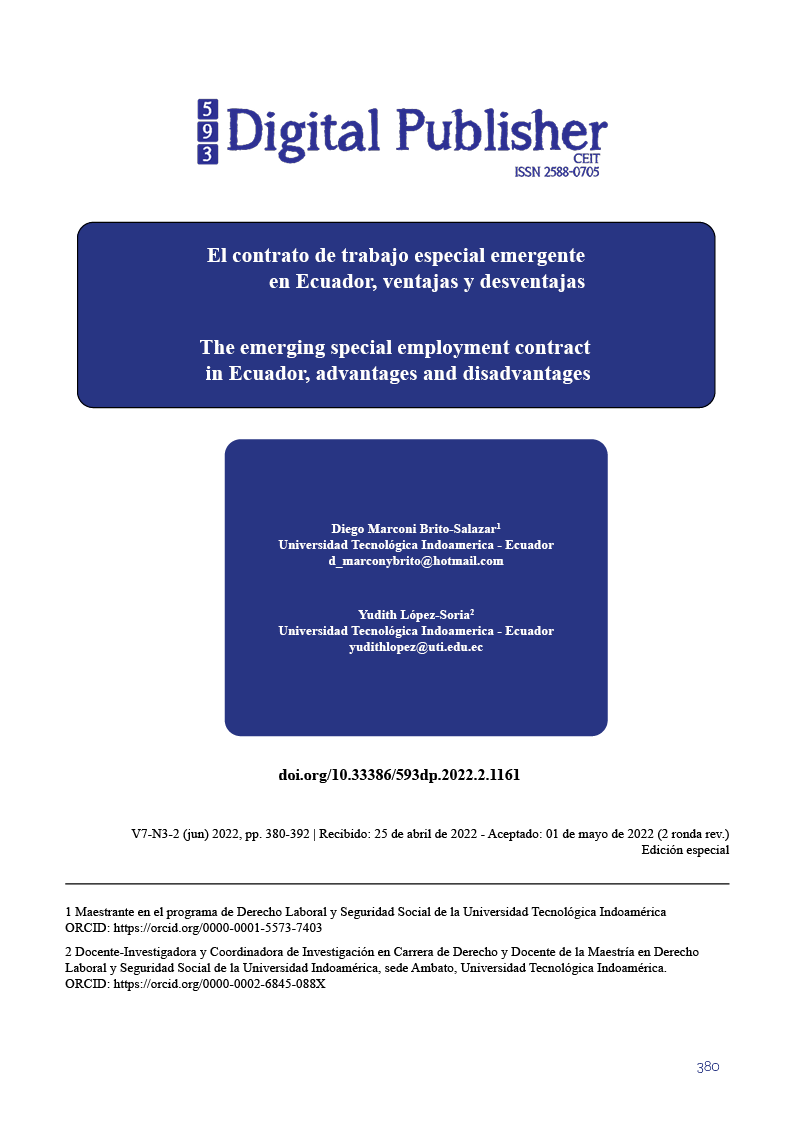The emerging special employment contract in Ecuador, advantages and disadvantages
Main Article Content
Abstract
The Organic Law of Humanitarian Support, published in the Official Registry, Supplement 229, dated June 22, 2020, among other stipulations, instituted measures to face the consequences derived from the health crisis caused by the coronavirus or also called, covid-19. Within this regulation, specifically in its article 19, the figure of the Special Emerging Labor Contract is created, a new type of contract that is added to those already existing in the Ecuadorian Labor Code. Its purpose was to reactivate the economy, improve production in the country and guarantee employment, recognizing rights for both workers and employers. The general objective is to critically review the legal figure of the special emerging labor contract, in order to assess whether said contractual figure has fulfilled the purpose for which it has been created. Points such as the origin and need for the special emerging contract were analyzed; its characteristics, its violation of the principle of job stability and its advantages and disadvantages. A qualitative approach has been applied with scientific methods such as historical-logical, analytical and inductive, and this work was concluded, establishing the advantages and disadvantages of this new contractual modality in labor matters.
Downloads
Article Details

This work is licensed under a Creative Commons Attribution-NonCommercial-ShareAlike 4.0 International License.
1. Derechos de autor
Las obras que se publican en 593 Digital Publisher CEIT están sujetas a los siguientes términos:
1.1. 593 Digital Publisher CEIT, conserva los derechos patrimoniales (copyright) de las obras publicadas, favorece y permite la reutilización de las mismas bajo la licencia Licencia Creative Commons 4.0 de Reconocimiento-NoComercial-CompartirIgual 4.0, por lo cual se pueden copiar, usar, difundir, transmitir y exponer públicamente, siempre que:
1.1.a. Se cite la autoría y fuente original de su publicación (revista, editorial, URL).
1.1.b. No se usen para fines comerciales u onerosos.
1.1.c. Se mencione la existencia y especificaciones de esta licencia de uso.
References
Asamblea Nacional Constituyente. (22 de junio de 2020). Ley Orgánica de Apoyo Humanitario. Publicada en el Registro Oficial Suplemento 229. https://www.registroficial.gob.ec/index.php/registro-oficial-web/publicaciones/suplementos/item/13070-suplemento-al-registro-oficial-no-229
Asamblea Nacional Constituyente (2005). Código de Trabajo. https://www.trabajo.gob.ec/wp-content/uploads/downloads/2012/11/C%C3%B3digo-de-Tabajo-PDF.pdf
Convención Americana sobre Derechos Humanos. (1969). Pacto de San José de Costa Rica. https://www.oas.org/dil/esp/tratados_b-32_convencion_americana_sobre_derechos_humanos.htm
Corte Constitucional del Ecuador. (2017). Sentencia N°017-17-SIN-CC Caso N° 0071-15-IN. https://portal.corteconstitucional.gob.ec/FichaRelatoria.aspx?numdocumento=017-17-SIN-CC
García, A. (2021). Implementación de Contrato especial emergente y su afectación de los derechos laborales en el Ecuador. (Universidad Católica Santiago de Guayaquil). http://repositorio.ucsg.edu.ec/bitstream/3317/16467/1/T-UCSG-PRE-JUR-DER-694.pdf
Lizama, L. (2005). Derecho del Trabajo, capítulo 5. (Universidad de Chile). https://www.ucursos.cl/derecho/2005/1/D128D0766/2/material_docente/
Ministerio de Trabajo. (2020). Acuerdo Ministerial Nro. MDT-2020-132. http://rfd.org.ec/repo/acuerdo-ministerial-132.pdf
Naciones Unidas. (1948). Declaración Universal de Derechos Humanos. https://www.un.org/es/about-us/universal-declaration-of-human-rights
Organización Mundial de la Salud (11 de marzo de 2020). Alocución de apertura del director general de la OMS en la rueda de prensa sobre la COVID-19 celebrada el 11 de marzo de 2020. https://www.who.int/es/director-general/speeches/detail/who-director-general-s-opening-remarks-at-the-media-briefing-on-covid-19---11-march-2020
Pacheco, C. (2020) El contrato especial emergente y su impacto en la estabilidad laboral. (Universidad Católica Santiago de Guayaquil). http://repositorio.ucsg.edu.ec/handle/3317/15824



